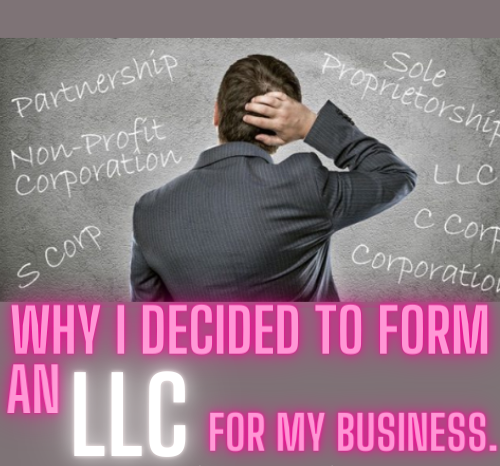By: Casey Capozzola
DISCLOSURE: This post may contain affiliate links, meaning this site may receive a commission if you decide to make a purchase through my links, at absolutely no cost to you. This please read my affiliate disclosure page for more information. Also, please read our article disclaimer

An LLC, or Limited Liability Company, is a popular business structure that combines a corporation’s benefits with a partnership’s flexibility. It offers limited liability protection for its owners, known as members while allowing for pass-through taxation like a partnership. This means that the LLC does not pay taxes on its profits; instead, the profits and losses are “passed through” to the individual members and reported on their tax returns.
An LLC can be a good choice for small business owners who want to separate their assets from their business assets and limit their liability for business debts and legal issues. This article will discuss some essential things you need to know about LLCs.
What are the main differences between a Sole Proprietor and vs LLC?
The key differences between sole proprietor and LCC are as follows:
Liability protection
A sole proprietorship does not offer any liability protection for the owner, and the owner is personally liable for any debts or legal issues. An LLC, however, provides limited liability protection for the owner.
Taxation
A sole proprietorship is taxed as a sole proprietor, meaning the owner pays personal income tax on their profits. An LLC is taxed as a pass-through entity, which means that the LLC profits are taxed at the individual rather than at the business level.
Ownership and management
A sole proprietorship is owned and managed by a single individual, and an LLC can have multiple owners and be managed by either the owners or a board of directors.
Can you convert a sole proprietorship to an LLC?
Yes, however, it is not a simple process and may require legal assistance. The owner of the sole proprietorship will need to file articles of organization and create an operating agreement for the LLC. The business will also need to obtain necessary licenses and permits and change its name if it is unsuitable for an LLC. It is recommended to consult with a legal professional to ensure a smooth transition from a sole proprietorship to an LLC.
Differences between LLC vs S Corp
There are several differences between LLCs (Limited Liability Companies) and S Corps (S Corporations). Some of the main differences include the following:
- Ownership structure: LLCs can have any number of owners, also known as “members”, who can be individuals or businesses. S Corps can only have a maximum of 100 shareholders, who must be individuals, not businesses.
- Taxation: LLCs are taxed as a partnership or sole proprietorship, depending on the number of owners. S Corps are taxed separately, but the income is passed to the shareholders and taxed individually.
- Formalities: LLCs have fewer formalities and requirements compared to S Corps. For example, LLCs do not need to hold annual meetings or keep formal minutes, and S Corps must follow more formal rules and procedures.
- Management structure: LLCs can be managed by the members or a professional manager. S Corps must have a board of directors and hold annual meetings.
- Liability protection: LLCs and S Corps provide liability protection for the owners, meaning that the owners are not personally liable for the debts and obligations of the business. However, S Corps offer slightly more protection as the shareholders are not liable for the corporation’s debts unless they guarantee them.
- Transferability of ownership: LLCs have more flexibility when transferring ownership. S Corps have more restrictions on the transfer of ownership and may require the board of directors’ approval.
How does LLC vs Incorporation compare?
LLC (Limited Liability Company) and incorporation are two different business structures that provide legal protection and separation between the business and its owners.
LLC
- Provides limited liability protection for its owners, also known as “members,” meaning their assets are protected in the event the business is sued or incurs debts.
- Members have the flexibility to choose how the business is managed and taxed.
- LLCs are easier to set up and operate compared to corporations.
Incorporation
- Provides the same limited liability protection for its owners, also known as “shareholders,” as an LLC.
- Owners have a more structured management system, with a board of directors and officers responsible for making decisions on behalf of the company.
- Corporations are subject to more regulations and paperwork requirements compared to LLCs.
Overall, LLCs offer a more flexible and streamlined option for small businesses, while incorporation may be more suitable for larger, more complex businesses. When deciding which structure is best, it is essential to consider a business’s specific needs and goals.
2 Ways to set Up an LLC
The first way to set up an LLC, you can. pay someone to do it for you. There is nothing wrong with this. If you are a busy person, have other things to set up, don’t want the burden of making sure that everything is done correctly, then just pay someone. The company we recommend is Incfile. Check them out for upfront, fair pricing.
The second way to set up an LLC, you need to do the following yourself:
Decide on a business name
Before setting up an LLC, you will need to decide on a business name. This should be unique and not already used by another company. You will also want to ensure that the name is not too similar to an existing business. You may need to check with your state’s business registration office to ensure your chosen name is available.
Designate a registered agent
To set up an LLC, you must designate a registered agent. This individual or business entity will be responsible for receiving legal documents on behalf of the LLC. The registered agent must have a physical address in the state where the LLC is being set up.
Get a copy of your state’s LLC Articles of organization form
Each state has its own specific requirements for setting up an LLC. Therefore, you will need a copy of your state’s LLC articles of organization form. This form will outline the requirements for setting up an LLC in your state, including information on the business name, registered agent, and other required information.
Prepare the LLC articles of organization form
Once you have a copy of your state’s LLC articles of organization form, you will need to complete it. This will include information about the business name, registered agent, and any other required information. You may also need to include information about the business owners, such as their names and addresses.
File the articles of organization
After you have completed the LLC articles of organization form, you will need to file it with the state business registration office. This will usually involve paying a filing fee.
Create an operating agreement
An operating agreement is a document that outlines how the LLC will be run, including information on the roles and responsibilities of the business owners, how decisions will be made, and how profits will be distributed. It is essential to create an operating agreement as it will help to ensure that the LLC is run smoothly and efficiently.
Keep your LLC active
To keep your LLC active, you must follow the state’s requirements for maintaining an LLC. This may include filing annual reports, paying required fees, and following state-specific requirements. Keeping your LLC active will ensure it remains in good standing and can continue operating.
Is it better to have an LLC or a corporation?

It depends on your business goals and needs. LLCs and corporations offer liability protection for their owners, but they have some key differences.
LLCs (Limited Liability Companies) offer flexibility in terms of management and taxation. They are often easier to set up and maintain than corporations, and they offer pass-through taxation, meaning the business profits and losses are taxed at the individual owner level rather than the business level.
Corporations, on the other hand, offer greater potential for growth and investment. They can issue stocks and sell them to raise capital, offering the owners more protection against personal liability. However, they also come with more complex legal and tax requirements.
Choosing between an LLC and a corporation depends on your business’s specific needs and goals. It may be helpful to consult with a business lawyer or financial advisor to determine the best option for you.
Conclusion
An LLC is a popular business structure that offers the liability protection of a corporation and the tax benefits of a sole proprietorship or partnership. Understanding the specific rules and regulations for LLCs in your state and the advantages and disadvantages of this type of business structure is essential. Ultimately, forming an LLC can provide peace of mind and financial security for business owners and help ensure the success of their businesses.

WELCOME! My name is Michael and I am the founder of Divide The Sea. Holding me back was the many unknowns and challenges in life and future. Once I made the decision to reach my life goals, I learned how to Fix My Credit, Make Money, Save Money, and Start A Business, my life was never the same. My goal now is to educate, because I find nothing more freeing than teaching others and seeing them change their lives like never before! No matter the difficulty, divide that sea and make it to your true destination.
Categories
Click Link Below For More Articles

Related Topics
Popular Blog Posts
About Michael
Michael is the founder of Divide The Sea. Many of us will not be educated in responsibility and preparing for the future. Michael saw this in himself and in his students. This website encourages those to divide the sea and make it to their destination. Here you can learn how to Fix Your Credit, Make Money, Save Money, and Start A Business
Please Subscribe To Our Newsletter!















